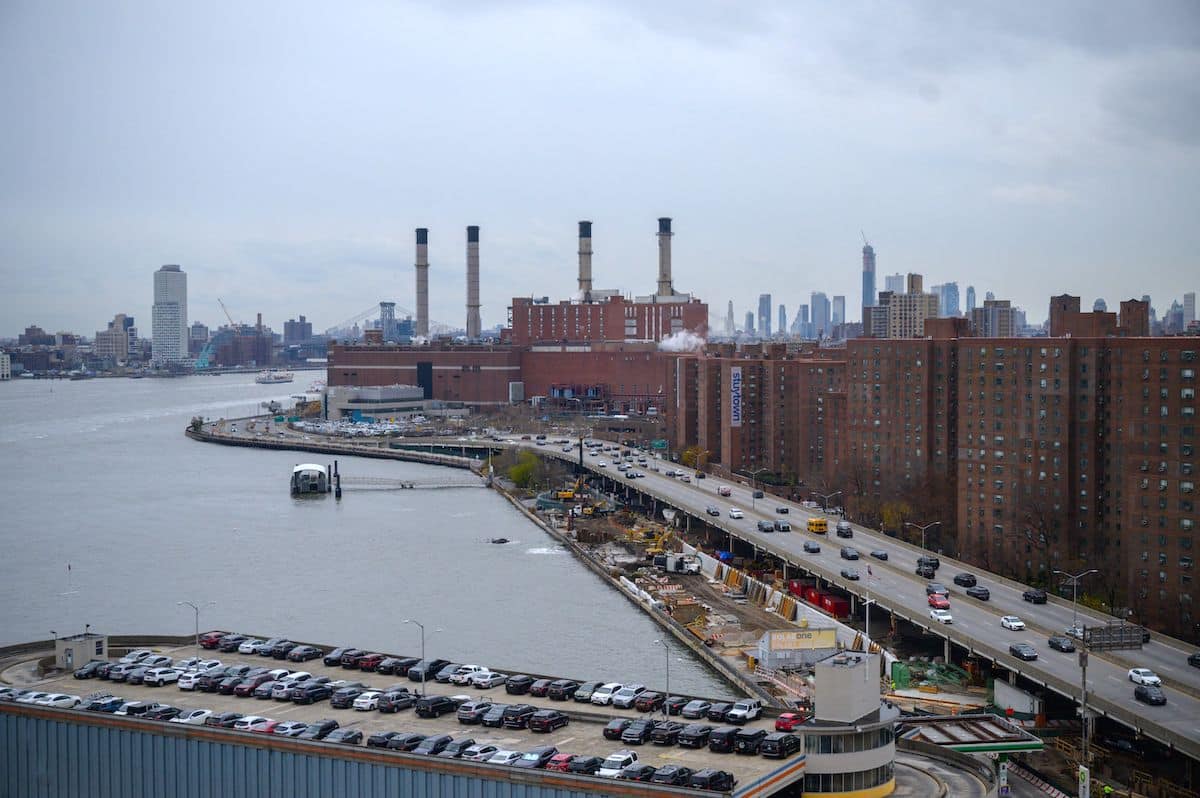Products You May Like
Construction work on a flood defense project on the east side of Manhattan, New York City, on Dec. 12, 2021. ED JONES / AFP via Getty Images
 Why you can trust us
Why you can trust us
Founded in 2005 as an Ohio-based environmental newspaper, EcoWatch is a digital platform dedicated to publishing quality, science-based content on environmental issues, causes, and solutions.
On the upcoming midterm elections Tuesday, November 8, New Yorkers have a chance to invest in a greener future for their state.
If voters approve Proposition #1, the “Clean Water, Clean Air, and Green Jobs Environmental Bond Act of 2022,” they would authorize New York to sell $4.2 billion worth of state bonds to finance projects to help the state reduce its greenhouse gas emissions, protect its environment and better prepare for the impacts of the climate crisis.
“When it comes to the worsening climate catastrophe, it’s hard not to get depressed. But action is warranted, not hand wringing. Prop #1 moves New York forward in adapting the state to the growing climate threats,” New York Public Interest Research Group Executive Director Blair Horner said in a statement reprinted by WAMC Northeast Public Radio.
The measure was actually passed by the state Legislature and Governor Kathy Hochul as part of the 2022 state budget, Gotham Gazette explained. However, any measure that increases New York state’s bond debt must be signed off on by voters. The proposition is the first environmental bond act on the New York ballot in 26 years, according to The Guardian.
If passed, the measure would:
- Put at least $1.5 billion towards mitigating climate change.
- Put at least $1.1 billion towards flood prevention and natural restoration.
- Put at least $650 million towards creating more green spaces and conserving nature.
- Put at least $650 million towards improving water quality and infrastructure.
The climate mitigation projects would include funneling at least $500 million towards electric school buses, reducing emissions from state-owned buildings and farms, making cities more resilient to heat waves through cooling centers and green space and curbing pollution in marginalized communities.
More From EcoWatch
“This is the first time in a generation that New Yorkers have had this opportunity to vote for environmental funding,” Nature Conservancy director of policy and strategy Jessica Ottney Mahar told Gotham Gazette. “The bond act is focused on really big issues facing all of our communities.”
Supporters of the act, which include the Democratic Party and several advocacy groups, say that it will fund much-needed improvements that will make the state more resilient to storms like 2012’s Superstorm Sandy, which killed 44 people in the state and cut power to 2.5 million, as Horner pointed out. Beyond Sandy, climate-fueled storms have cost the state $50 to $100 billion over the last two decades, according to a 2022 federal report. The bond money will also allow the state to update infrastructure like lead pipes.
“A lot of New Yorkers are still relying on infrastructure that was put into the ground 100 years ago, so it’s time for some upgrades,” Ottney Mahar told The Guardian.
The main opposition to the proposal comes from the Conservative Party and other fiscal conservatives who argue against taking on more debt.
“New Yorkers do not need another $4.2 billion in public debt, together with its resulting debt service,” state Conservative Party Chair Gerard Kassar said in a statement reported by Gotham Gazette.
However, proponents, who are more vocal and organized, counter that this view is short-sighted. One study found that the bond could create 84,000 jobs. Further, Ottney Mahar told The Guardian that the money would make it easier for New York to access funds from the bipartisan Infrastructure Act and the Inflation Reduction Act that require matching state funds for federal support.
“It’s good debt,” New York League of Conservation Voters President Julie Tighe said, as Gotham Gazette reported.
So far, it looks like voters agree with her. A Siena Research Institute poll from mid-October found that 54 percent of voters supported the proposal and 26 percent opposed it.
“Climate change is a very important issue for voters, not just in New York or in the United States, but globally,” deputy director of research for the Rockefeller Institute of Government Laura Rabinow said, as The Guardian reported. “I think the goals themselves are a reflection of that building consensus.”
Subscribe to get exclusive updates in our daily newsletter!
By signing up, you agree to the Terms of Use and Privacy Policy & to receive electronic communications from EcoWatch Media Group, which may include marketing promotions, advertisements and sponsored content.
